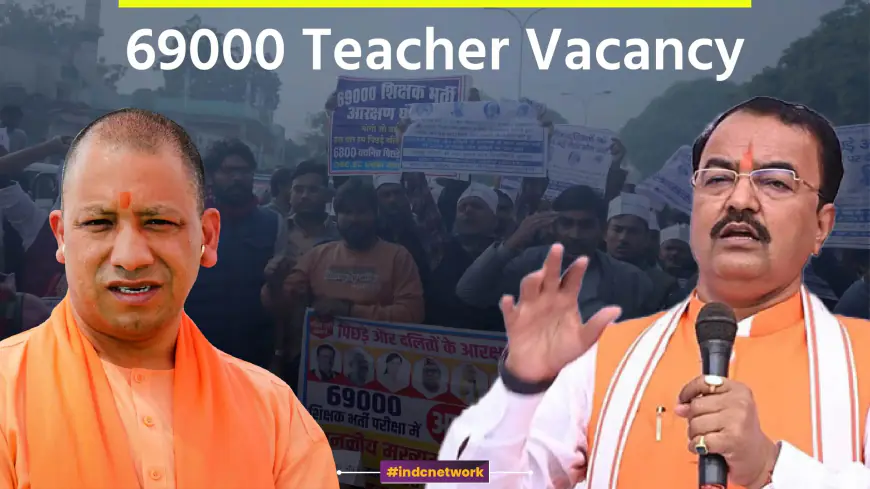Allahabad High Court Orders New Merit List for 69,000 Assistant Teachers Recruitment in Uttar Pradesh
The Allahabad High Court has quashed the selection lists for the recruitment of 69,000 assistant teachers in Uttar Pradesh, directing the state government to prepare a new merit list. The decision follows allegations of a reservation scam affecting 19,000 seats, and the court has ordered that the new list must ensure proper implementation of reservation rules. The ruling aims to minimize disruption to current teachers and students while ensuring a fair and transparent recruitment process.

INDC Network : Uttar Pradesh : Allahabad High Court Orders New Merit List for 69,000 Assistant Teachers Recruitment in Uttar Pradesh
The Allahabad High Court has directed the Uttar Pradesh government to prepare a new merit list for the appointment of 69,000 assistant teachers in the state. The court has quashed the selection lists issued in June 2020 and January 2022, which included 6,800 candidates. A bench comprising Justices AR Masoodi and Brijraj Singh passed this order while disposing of 90 special appeals filed by Mahendra Pal and others, challenging a single judge's order from March 13 of the previous year.
What Is the Whole Matter?
This case dates back to December 2018, when an advertisement was issued for the recruitment of 69,000 primary teachers in Uttar Pradesh. In 2019, 410,000 candidates appeared for the examination, and the results were released in 2020. Out of these candidates, 147,000 passed the exam, with 110,000 belonging to the reserved category.
Questions Raised on Teacher Recruitment Process
The recruitment process based on this merit list led to the appointment of 69,000 teachers in Uttar Pradesh. However, the process soon came under scrutiny. Allegations were made that about 19,000 candidates from the reserved category did not receive the benefits of reservation. Several candidates approached the court, questioning the fairness of the recruitment process.
The Court's Decision
The latest order from the Allahabad High Court, uploaded on the court's website, mandates that while preparing the new selection list, efforts should be made to minimize any adverse effects on the currently working assistant teachers. This is to ensure that these teachers can complete the current academic session, preventing disruption in students' education. Additionally, the bench modified an earlier order, stating that reserved category candidates who qualify in the general category merit list should be transferred to the general category.
What Will Happen Next?
The double bench of the Allahabad High Court has now ordered the cancellation of the entire merit list in the 69,000 teacher recruitment case. Although the Uttar Pradesh government argued that the recruitment was conducted as per the rules, the court has directed the government to issue a new merit list within three months. This new list must ensure the proper implementation of reservation policies and education rules, ensuring a fair and transparent recruitment process.
The Reservation Scam Allegations
The case of a reservation scam in the recruitment of 69,000 teachers in Uttar Pradesh had been ongoing for a long time, and now the double bench of the Allahabad High Court has delivered its verdict. It has been proven that a reservation scam occurred on 19,000 seats in this recruitment. Consequently, the High Court has canceled the entire list of teacher recruitment. The court has ordered that a new list be prepared following the Reservation Rules of 1981 and 1994.
Earlier, a single bench of the Lucknow High Court had also accepted that there was a reservation scam on 19,000 seats in the recruitment of 69,000 teachers. The reservation-affected candidates have demanded strict action against the officials responsible for the reservation scam in the recruitment process. They argue that justice should be served, and all those who participated in the recruitment process illegally should be excluded.
Background: When and Why Did the Uproar Start?
The controversy began during Akhilesh Yadav's tenure as Chief Minister of Uttar Pradesh when 137,000 Shikshamitras (temporary teachers) were made assistant teachers. The matter was taken to the High Court, which then canceled the government's adjustment. When the Yogi government came to power, the High Court assigned them the responsibility to recruit teachers for these 137,000 posts. However, the Yogi government stated that recruiting such a large number of teachers at once was not feasible. Consequently, the High Court instructed the government to carry out the recruitment in two phases, leading to the issuance of vacancies for 68,500 posts in 2018.
The Uproar Over the Second Phase of Teacher Recruitment
According to the teacher candidates, more than 22,000 posts were left vacant in the first phase of assistant teacher recruitment, which did not cause much controversy. However, the government later announced recruitment for 69,000 posts in the second phase. The exam for these posts was held in January 2019, and jobs were subsequently offered based on the cutoff scores. This is where the situation became complicated.
Teacher candidates claimed that in the recruitment of 69,000 teachers, the OBC category received only 3.86% reservation instead of the mandated 27%, while the SC category received 16.6% instead of the required 21%. Candidates alleged that a scam occurred on 19,000 seats during this recruitment process.
What Does the Reservation Rule Say?
According to the Basic Education Rules of 1981, if a candidate from the OBC category scores more than the cutoff set for the unreserved category, they should receive a job in the unreserved category, not in the OBC category. This means such candidates would not fall under the purview of reservation. However, this rule was not followed in the UP Assistant Teacher Recruitment, leading to the uproar.
The case of the 69,000 assistant teacher recruitment in Uttar Pradesh has highlighted significant issues with the reservation process and recruitment transparency. With the Allahabad High Court's order for a new merit list, the hope is that the upcoming recruitment process will be fair, transparent, and in full compliance with the reservation rules. This case serves as a crucial reminder of the importance of adhering to established guidelines in public sector recruitment to ensure justice and equity for all candidates.
What's Your Reaction?














































































































































































